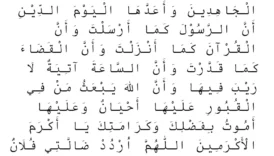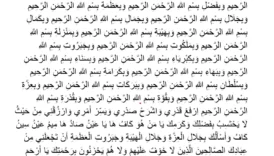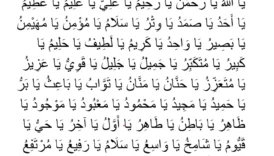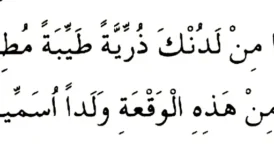Salat al-Munjiya (Salātan Tunjīnā) for Unexplained Illness and Distress
In Islamic tradition, there are numerous supplications (du‘ā’) recommended to believers seeking relief from specific ailments, both physical and spiritual. One such prayer is Salat al-Munjiya, also known as Salātan Tunjīnā. This prayer is widely regarded as a powerful means of invoking God’s help for serious issues—including unexplained illnesses, overwhelming hardships, and dire personal needs.
- Salat al-Munjiya (Salātan Tunjīnā) for Unexplained Illness and Distress
- 1. Why Salat al-Munjiya?
- 2. The Text of Salat al-Munjiya
- Arabic (Separate Line)
- Transliteration (Separate Line)
- English Approximate Meaning (Separate Line)
- 3. Recommended Times and Methods of Recitation
- 4. Reported Benefits and Virtues
- 5. Practical Tips for Integrating Salat al-Munjiya
- Turning to Allah with Hope
Below is an overview of Salat al-Munjiya, its recommended usage, and the benefits often associated with its recitation.
1. Why Salat al-Munjiya?
- Highly Esteemed by Scholars:
Islamic scholars describe Salat al-Munjiya as a spiritual “antidote” or “elixir.” They often say that any legitimate need for which it is read has a strong likelihood of being fulfilled by Allah (God). - For Unknown or Incurable Illness:
There is a tradition suggesting that if a person suffers from a mysterious or “incurable” illness, reciting Salat al-Munjiya 1,001 times (particularly on a Thursday night leading into Friday) can bring divine relief. If one recites it with the intention of finding a cure and then sleeps on their right side, it is said they may receive guidance about a remedy in a dream. - Cure for All Kinds of Distress:
Salat al-Munjiya is often described as effective in removing spiritual hardships, personal worries, or even adversarial fears. Hence, it is referred to by some as the “Rescue Prayer.”
2. The Text of Salat al-Munjiya
Arabic (Separate Line)
اللّٰهُمَّ صَلِّ عَلٰى سَيِّدِنَا مُحَمَّدٍ وَعَلٰى آلِ سَيِّدِنَا مُحَمَّدٍ،
صَلَاةً تُنْجِينَا بِهَا مِنْ جَمِيعِ الْأَهْوَالِ وَالْآفَاتِ،
وَتَقْضِي لَنَا بِهَا جَمِيعَ الْحَاجَاتِ،
وَتُطَهِّرُنَا بِهَا مِنْ جَمِيعِ السَّيِّئَاتِ،
وَتَرْفَعُنَا بِهَا عِنْدَكَ أَعْلَى الدَّرَجَاتِ،
وَتُبَلِّغُنَا بِهَا أَقْصَى الْغَايَاتِ مِنْ جَمِيعِ الْخَيْرَاتِ فِي الْحَيَاةِ وَبَعْدَ الْمَمَاتِ،
إِنَّكَ عَلٰى كُلِّ شَيْءٍ قَدِيرٌ.
Transliteration (Separate Line)
“Allāhumma ṣalli ‘alā sayyidinā Muḥammadin wa ‘alā āli sayyidinā Muḥammad,
ṣalātan tunjīnā bihā min jamī‘i’l-ahwāli wa’l-āfāt,
wa taqḍī lanā bihā jamī‘a’l-ḥājāt,
wa tuṭahhirunā bihā min jamī‘i’s-sayyi’āt,
wa tarfa‘unā bihā ‘indaka a‘lā’d-darajāt,
wa tuballighunā bihā aqṣā’l-ghāyāt min jamī‘i’l-khayrāti fī’l-ḥayāti wa ba‘da’l-mamāt,
innaka ‘alā kulli shay’in qadīr.”
English Approximate Meaning (Separate Line)
“O Allah! Bestow Your blessings upon our master Muhammad and upon the family of our master Muhammad. Grant a form of blessing by which You deliver us from all fears and calamities, fulfill all our needs, cleanse us from all sins, raise us to the highest levels in Your presence, and enable us—through this blessing—to reach the furthest limits of every goodness in this life and after death. Truly, You have power over all things.”
3. Recommended Times and Methods of Recitation
- Friday Night (Laylat al-Jumu‘ah)
- Many narrations mention reciting Salat al-Munjiya 1,001 times on Thursday night (the eve of Friday).
- This practice is often associated with breakthroughs in personal crises, unexplained health conditions, and dire needs.
- Seeking a Cure in Dreams
- If you’re confronted by a severe or mysterious illness, it is said you can recite this prayer 1,001 times, pray for a cure, then lie on your right side.
- According to tradition, God may reveal either a direct cure or a pathway to healing while you sleep.
- After Prayers or During Zikr (Remembrance)
- Some believers incorporate Salat al-Munjiya in their post-prayer supplications.
- While certain scholars caution against labeling it an obligatory practice, many see it as a beneficial and voluntary addition to one’s daily devotions.
- Whenever You Feel Distressed
- Beyond formal prayer times, you can recite Salat al-Munjiya if you find yourself overwhelmed, facing an enemy, or in a situation requiring urgent divine help.
4. Reported Benefits and Virtues
- Spiritual and Physical Protection:
Those who regularly recite this prayer often testify to experiencing a sense of security, especially in the face of adversity or conflict. - Enhanced Blessings (Barakah) and Provision (Rizq):
Many believe that reciting Salat al-Munjiya can lead to increased sustenance, personal fulfillment, and relief from day-to-day burdens. - Reward of Sending Salawat (Blessings) on the Prophet:
The text of Salat al-Munjiya itself is essentially a salutation upon the Prophet Muhammad (peace be upon him). Each recitation thus brings the same spiritual merit as other forms of salawat. - Rescue from Major Hardships:
Some call it a “rescue prayer” because it has been historically recited in times of desperation—war, illness, or severe crisis—with the hope of miraculous intervention. - Facilitating Accepted Supplications:
It is said that offering two rak‘āt (units) of prayer followed by repeated recitations of Salat al-Munjiya can pave the way for one’s personal du‘ā’s to be accepted.
5. Practical Tips for Integrating Salat al-Munjiya
- Prepare Spiritually:
- Perform ablution (wuḍū’) if possible.
- Approach the recitation with a humble, hopeful heart.
- Maintain Sincerity and Focus:
- Reciting mechanically might lessen the spiritual impact. Sincere intention (niyyah) is key.
- Ponder the meaning, especially when reflecting on God’s power and the hope for deliverance.
- Stay Consistent:
- Even if immediate results are not seen, continued recitation fosters stronger faith and patience.
- Incorporate it into your daily routine or weekly devotions.
- Support with Good Deeds and Ethics:
- Supplications find acceptance more readily when coupled with honest conduct, lawful sustenance, and charitable deeds.
- Seek medical assistance for illnesses as well—Islam encourages blending spiritual practice with practical measures.
Turning to Allah with Hope
Salat al-Munjiya exemplifies the Islamic emphasis on hope, faith, and prayer in times of despair. While its practice is not mandated by any strict legal ruling, countless believers have found solace and relief through its recitation. Whether you face an unexplained illness, overwhelming hardship, or simply desire to deepen your spiritual life, Salat al-Munjiya can serve as a powerful means of connecting with the Divine.
Remember: Ultimate healing and rescue belong to God alone, and sincere prayer is a primary channel through which believers seek and receive His mercy.
Views: 5





